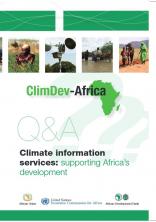Q&A Climate information services: supporting Africa’s development

Climate information services – the packaging and dissemination of climate information to specific users – are vital in supporting Africa’s response to climate change. With robust cli-mate information, Africa can safeguard the economic gains and advances in social develop-ment seen across the continent over the last decade. Joseph Instiful, Senior Climate Science Expert at the African Climate Policy Centre (ACPC) discusses the links between climate information and Africa’s development, identifies the bar-riers in generating high quality climate information and explains why means to strengthen ICT infrastructure must be high on the agenda at COP21 in Paris.
How do climate information services support Africa’s development agenda?
- Africa’s core economic sectors are highly vulnerable to the impacts of climate variability and change. Taking agriculture as an example, the sector contributes to around 30 per cent of GDP and employs up to 80 per cent of the population.
- Climate observing systems show that rainfall in Africa is becoming increasingly erratic and since more than 90 per cent of our agriculture is rainfed, this sector stands to be one of the hardest hit by climate variability and change.
- Unless we have a strong, scientific understanding of the impacts of these changing weather and climate patterns on our vital sectors – and how this will change in the future – Africa’s sustainable develop-ment agenda is at risk. On the flipside, with effective climate infor-mation services, our climate-sensitive sectors will be able to cope better with increased variability, bringing greater agricultural and other productivity while building resilience and improving livelihoods across the continent.